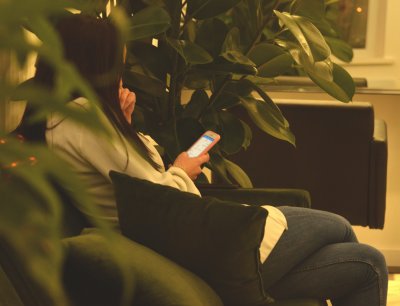Separation Anxiety: Fall Apart When it Comes to Time Apart?

photo by Thanh Duc Phan
by Victoria Stokes
How do you feel when you’re away from your nearest and dearest? Panicked? Anxious? Distressed? You could be dealing with separation anxiety.
Yes, the term is more often used in the context of children or dogs. But this is about to change. Adults can suffer similar, and it is about to become a diagnosable disorder.
What is separation anxiety?
Some people call it ‘being clingy’. Others refer to it as ‘over-dependence’. Whatever name you give it, separation anxiety commonly manifests as feeling worried, anxious, or panicked when apart from a particular person, like a friend or spouse.
It can also lead to extreme jealousy and unhealthy relationship patterns, difficulty sleeping when apart, and feeling unable to cope when that person is not around.
These feelings might seem amplified at the moment if you’ve spent an increased amount of time at home with your kids, partner, pets or roommates due to the pandemic. And now you are suddenly thrust back into the routine of normal life.
What causes clingy feelings?
 Not everyone experiences feelings of anxiety when they’re left alone, so why are some people seemingly predisposed to it?
Not everyone experiences feelings of anxiety when they’re left alone, so why are some people seemingly predisposed to it?
1. Fear of being alone.
While some people relish time by themselves, others don’t like to be left alone with their thoughts. The company of other people can be a welcome distraction to uncomfortable emotions that they are unsure how to deal with.
Autophobia is an extreme form of this. People with this phobia are fearful of being alone or lonely, and feel they need to be in the company of others to feel safe.
However, many people don’t fear being alone until they are going through something difficult. You might find it easier to cope when in the company of those closest to you. If you’re feeling especially clingy right now, it could be because you simply need that extra support.
2. Anxious attachment.
Always felt fearful about time spent apart? It could be down to your attachment style.
Attachment Theory was first put forward by psychologist John Bowlby, who proposed that infants needed to form a close emotional bond with a caregiver in order to form healthy relationships in adulthood. Others added to the theory, and now the four attachment styles that tend to be referred to are secure, anxious-avoidant, anxious-ambivalent, and fearful-avoidant.
‘Anxious attachment‘ typically leads to having a hard time feeling secure in relationships. It can mean you have issues with over-dependency, jealousy, and clinginess.
3. Separation anxiety disorder.
The next version of the World Health Organisation’s diagnostic health manual, the ICD-11, will now classify separation anxiety as a disorder that is not just for children but also for adults.
So if your apprehension about being separated from the people you are emotionally attached to affects your ability to cope and thrive, you can now be diagnosed with this disorder.
4. Borderline Personality Disorder (BPD).
Separation anxiety can also be a symptom of borderline personality disorder (BPD), a mental health condition characterised by unstable moods and poor self-image. It can be common for people with BPD to lash out when they experience separation anxiety. This can sabotage their relationships at a time when what they really want is closeness.
How To Manage Separation Anxiety
 So, what should you do if you’re struggling with separation anxiety, and feeling fearful of being alone?
So, what should you do if you’re struggling with separation anxiety, and feeling fearful of being alone?
1. Try short bursts apart.
Exposure therapy suggests that when you’re exposed to the thing you fear most, but within a safe setting? And for a short time frame? Over time, this may help you to overcome your distress.
You don’t need to be apart from your person for hours at a time. Instead, you could start being by yourself for a short period. Nip out for some fresh air by yourself, do the grocery shopping on your own, or even spend time in another room.
If actually being apart from your loved one feels too daunting, visualisation techniques may help. You could imagine being separated for a few moments and write down how you feel.
Eventually, you may build up the courage to spend some time apart. You may even learn to enjoy your own company.
2. Question the validity of your thoughts.
Not every thought we have is true. It can be helpful to monitor your thoughts before feelings of panic and distress come on. You could try asking helpful questions to get to the root of the problem, such as ‘what am I feeling?’. ‘Is this negative thought I’m having actually true?’. ‘What am I fearful of?.
A diary may help you record your thoughts and identify patterns. A 2018 observational study found that this kind of expressive writing can improve resilience.
3. Turn to relaxation techniques.
Popular relaxation methods can calm an anxious mind – and there are many you can try. Some people find meditation effective and an in-depth scientific review indicates that it can moderately improve anxiety.
Other ways to relax and find calm include yoga, progressive muscle relaxation, and deep breathing exercises. Of course, the most effective relaxation technique is the one that works best for you.
Can therapy help my separation anxiety?
If separation anxiety stems from issues in your childhood, talking to a therapist may help. A qualified therapist can support you in identifying the root cause of your anxiety and provide tools that will help you manage it.
Cognitive behavioural therapy (CBT) can be a good choice. A 2011 scientific review concluded that it’s an effective treatment for a wide range of anxiety disorders. It works by encouraging you to identify and change unhelpful thoughts patterns and cope with stress.
If you feel you might have borderline personality disorder, consider schema therapy, dialectical behaviour therapy, or transactional analysis.
Need help with your fear of being deserted and alone? We put you in touch with a team of London’s most highly regarded talk therapists. Or use our booking platform to source UK-wide talk therapists for all budgets.
Still have a question about separation anxiety? Ask in the comment box below.
 Victoria Stokes is a Belfast-based writer and journalist who has written thousands of articles on mental health, emotional wellbeing and personal development. She lists espresso martinis and the colour pink among her favourite things. Keep up with her on Instagram.
Victoria Stokes is a Belfast-based writer and journalist who has written thousands of articles on mental health, emotional wellbeing and personal development. She lists espresso martinis and the colour pink among her favourite things. Keep up with her on Instagram.




